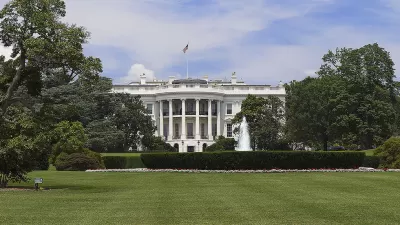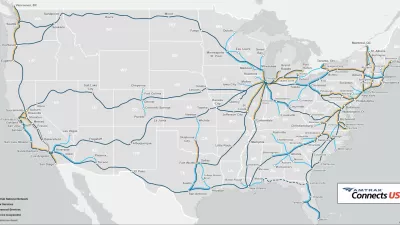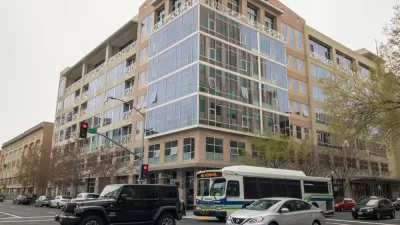The Biden administration has proposed a suite of policy and funding programs designed to create and protect 100,000 affordable housing units. If successful, the program will still fall well short of the need.

In a statement echoing its pledge to "Build Back Better," the Biden administration this morning announced a plan to create 100,000 additional affordable homes.
While it announces clear support for affordable housing development, the proposal is unlikely to bridge the immense gap between the supply of affordable housing and the need. The National Low Income Housing Coalition estimates that the country needs 7.2 million affordable housing units to fill the gap between supply and demand. For a comparison of ambition, New York City Mayor Bill de Blasio in 2014 proposed an affordable housing program that aimed to create or protect 200,000 housing units.
In announcing its support of a supply-side approach to the affordable housing shortage, the proposal clearly acknowledges the role of supply and demand imbalance in the rising cost of housing around country. "The large and long-standing gap between the supply and demand of affordable homes for both renters and homeowners makes it harder for families to buy their first home and drives up the cost of rent," reads the statement.
The statement also acknowledges the supply constraints caused by the increasing footprint of large, institutional, and corporate investors in the housing market—positioning the announcement on the YIMBY side of the spectrum of U.S. housing and development politics.
To create and protect 100,000 units, the proposal relies mostly on the financial mechanisms of federal institutions to unlock new opportunities for affordable housing. For example, the proposal would boost affordable housing supply by relaunching the Federal Financing Bank—a partnership between the U.S. Department of Treasury and the U.S. Department of Housing and Urban Development. The Federal Financing Bank allows state housing finance agencies to provide low-cost capital for affordable housing development.
Another financing mechanisms included in the proposal would increase the Low Income Housing Tax Credit (LIHTC) investment cap. The LIHTC program was blamed by a recent article published by the Financial Times for creating some of the market for companies like Blackstone to make large inroads into the housing market.
The proposal announces a forthcoming funding availability through the U.S. Department of Treasury's Capital Magnet Fund (CMF). "This year’s historic pool of $383 million in available funding will facilitate the production of affordable housing units throughout the country," according to the statement.
The proposal also shows direct support for manufactured homes and duplexes, three-plexes, and four-plexes—the latter variety of residential density has been the desire of a series zoning reforms approved by a growing number of cities and states. To support these alternative housing typologies, the proposal notes a recent decision by the Federal Housing Finance Authority (FHFA) to accept loan delivery on single-wide manufactured housing. The FHFA also recently authorized Freddie Mac to revisit mortgage eligibility requirements for 2-4 unit properties. Eligibility requirements approved in 2020 "reduced financing available by Freddie Mac for these kinds of properties," according to the proposal.
Among the other provisions of the proposal, the Biden administration promises to leverage federal funding to spur state and local zoning reforms, which might read at first glance as similar to the program proposed by the Housing Supply and Affordability Act, authored by Senator Amy Klobuchar (D-Minn.), with Senator Tim Kaine (D-Virginia), and Senator Rob Portman (R-Ohio) in March 2021. However, this proposal would target HUD block grant funding buy tasking the HUD Office of Community Planning and Development with the creation of a Housing Supply Toolkit, with guidance for deploying existing block grants and other resources to address supply and affordability challenges.
More specifics on the Biden administration's foray into housing policy—announced a day after the scheduled expiration of the federal government's eviction moratorium—are included in the article posted on the White House's website. Planetizen will continue tracking reactions and analysis to the proposal in the coming days.

Maui's Vacation Rental Debate Turns Ugly
Verbal attacks, misinformation campaigns and fistfights plague a high-stakes debate to convert thousands of vacation rentals into long-term housing.

Planetizen Federal Action Tracker
A weekly monitor of how Trump’s orders and actions are impacting planners and planning in America.

In Urban Planning, AI Prompting Could be the New Design Thinking
Creativity has long been key to great urban design. What if we see AI as our new creative partner?

King County Supportive Housing Program Offers Hope for Unhoused Residents
The county is taking a ‘Housing First’ approach that prioritizes getting people into housing, then offering wraparound supportive services.

Researchers Use AI to Get Clearer Picture of US Housing
Analysts are using artificial intelligence to supercharge their research by allowing them to comb through data faster. Though these AI tools can be error prone, they save time and housing researchers are optimistic about the future.

Making Shared Micromobility More Inclusive
Cities and shared mobility system operators can do more to include people with disabilities in planning and operations, per a new report.
Urban Design for Planners 1: Software Tools
This six-course series explores essential urban design concepts using open source software and equips planners with the tools they need to participate fully in the urban design process.
Planning for Universal Design
Learn the tools for implementing Universal Design in planning regulations.
planning NEXT
Appalachian Highlands Housing Partners
Mpact (founded as Rail~Volution)
City of Camden Redevelopment Agency
City of Astoria
City of Portland
City of Laramie






























